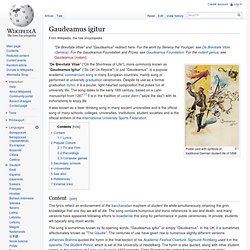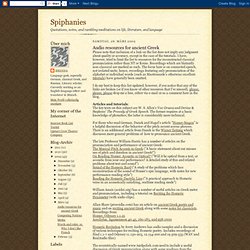

Gaudeamus igitur. Postal card with symbols of traditional German student life of 1898 "De Brevitate Vitae" ("On the Shortness of Life"), more commonly known as "Gaudeamus Igitur" ("So Let Us Rejoice") or just "Gaudeamus", is a popular academic commercium song in many European countries, mainly sung or performed at university graduation ceremonies.

Despite its use as a formal graduation hymn, it is a jocular, light-hearted composition that pokes fun at university life. The song dates to the early 18th century, based on a Latin manuscript from 1287.[1] It is in the tradition of carpe diem ("seize the day") with its exhortations to enjoy life. GAUDEAMUS IGITUR. Donatus. Subjunctive. Textkit - Greek and Latin Learning Tools.
Greek & Latin Literature. Audio resources for ancient Greek. Please note that inclusion of a link on the list does not imply any judgment about quality or accuracy, except in the case of the tutorials.

I have, however, tried to limit the list to resources for the reconstructed classical pronunciation rather than NT or Koine. Recordings which are blatantly non-classical are marked as such. The focus here is on connected speech, not isolated units; hence, recordings featuring only pronunciation of the alphabet or individual words (such as Mastronarde's otherwise excellent tutorials) have generally been omitted.
I do my best to keep this list updated; however, if you notice that any of the links are broken (or if you know of other resources that I've missed), please, please, please drop me a line, either via e-mail or as a comment here in the blog.